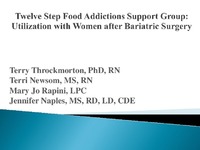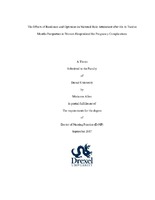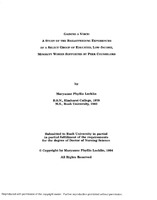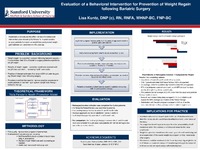| dc.contributor.author | Throckmorton, Terry A. | en |
| dc.date.accessioned | 2012-01-11T11:15:55Z | |
| dc.date.available | 2012-01-11T11:15:55Z | |
| dc.date.issued | 2012-01-04 | |
| dc.identifier.uri | http://hdl.handle.net/10755/202209 | en |
| dc.description | <p>41st Biennial Convention: People and Knowledge: Connecting for Global Health</p> | en |
| dc.description.abstract | <p>The Twelve Step Food Addictions Support Group, based on the Twelve Step Alcoholics Anonymous program, highlights the spiritual journey of recovery and attempts to meet emotional needs and empower women following bariatric surgery. This pilot study was designed to evaluate the potential of this process in enhancing QOL and decreasing food addiction and depression levels. The Twelve Step Food Addictions Support Group met monthly co-led by a dietitian and psychotherapist. Participants self-enrolled in the program offered by The Methodist Hospital Weight Management Center. The Eating Attitudes Test, Quality of Life Inventory, and the Beck Depression Inventory-II were used to explore changes in food addiction, quality of life, and depression among post-surgery bariatric women enrolled in the group over a twelve month time period. Participants were asked to complete the questionnaires at Steps 1, 6 and 12. Demographic information and body weights were also obtained at these points. Seven women completed all three measurements. Ages varied from 31 to 67 years, weights from 175 to 330 pounds. Five were Caucasian, one Hispanic, and one African American. Mean scores on the Eating Attitudes Test varied from 21.28 at point one to 13.42 at time three. Mean depression scores were 13 at point one and declined to 6.28. Mean quality of life scores consistently improved throughout the measurements from 1.28 to a final measure of 2 with 1 indicating low QOL and 2 indicating average QOL. However none of these differences were statistically significant using Friedman's Multiple Comparison Test. Qualitative data indicated that participation in the group empowered the women to make more assertive decisions and to continue as their own support group after the program. For this small group of women who had begun gaining weight, the program resulted in decreased depression, slightly decreased food addiction, and increased QOL scores.</p> | en |
| dc.format | Text-based Document | en |
| dc.language.iso | en_US | en |
| dc.subject | Support Groups | en |
| dc.subject | Bariatric Surgery | en |
| dc.subject | Obesity | en |
| dc.title | Twelve step food addictions support group: Utilization with women after bariatric surgery | en |
| dc.type | Presentation | en |
| dc.rights.holder | <p>
All rights reserved by the author(s) and/or publisher(s) listed in this item record unless relinquished in whole or part by a rights notation or a Creative Commons License present in this item record.
</p><p>
All permission requests should be directed accordingly and not to the Sigma Repository.
</p><p>
All submitting authors or publishers have affirmed that when using material in their work where they do not own copyright, they have obtained permission of the copyright holder prior to submission and the rights holder has been acknowledged as necessary.
</p> | en |
| dc.description.note | <p>Items submitted to a conference/event were evaluated/peer-reviewed at the time of abstract submission to the event. No other peer-review was provided prior to submission to the Henderson Repository, unless otherwise noted.</p> | |
| dc.type.category | Full-text | en |
| dc.evidence.level | N/A | en |
| dc.research.approach | N/A | en |
| dc.author.details | Terry A. Throckmorton, PhD, RN | en |
| dc.conference.name | 41st Biennial Convention: People and Knowledge: Connecting for Global Health | en |
| dc.conference.host | Sigma Theta Tau International | en |
| dc.conference.location | Grapevine, Texas, USA | en |
| dc.date.conferenceyear | 2011 | |
| dc.description.reviewtype | Abstract Review Only: Reviewed by Event Host | en |
| dc.description.acquisition | Proxy-submission | en |





